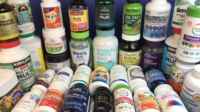Our Members Asked:
Do vitamins, minerals or other supplements lose effectiveness with exposure to high temperatures?

Answer:
Many vitamins and other supplements can degrade faster and lose effectiveness when exposed to excessive heat, light, oxygen in the air, or humidity. Even under ideal conditions, vitamins normally degrade over time, but this process is accelerated by poor storage conditions.
Heat can also increase the breakdown of softgel shells, which may lead to exposure of the contained ingredients to air, speeding degradation due to oxidation. Gelatin softgels can melt at a temperature of over 140 degrees Fahrenheit.
Although overly degraded supplements may not be unsafe to take, you won't receive the amount of ingredient stated on the label and may not get the desired effect.
Which Supplements Are Affected By Environmental Factors?
Here's how different types of supplements are affected by the environment, particularly heat:
Vitamins
Vitamins A, B-12, and C are inherently less stable than other vitamins such as niacinamide and vitamin E esters so be very careful to keep them out of heat (AESGP, 2003).
Also try to limit the exposure of water-soluble vitamins such as vitamin C and the B vitamins to humidity, as they are more susceptible to breakdown with moisture than fat-soluble vitamins like A, D and K. In fact, researchers have found that a high-humidity environment can cause some products to completely lose vitamin C content within a week (Hiatt, J Agric. Food Chem 2010).
Fish/Marine Oils and Seed Oils (Omega-3 and Omega-6 Fatty Acids)
The biggest risk with these oils is not heat, but exposure to oxygen in air, which can cause the oils to become rancid due to oxidation. This occurs faster, however, as the temperature increases. Many oils are packaged in ways that reduce exposure to oxygen (such as replacing air in bottled oils with nitrogen), retarding spoilage until the container is opened. Some also have added antioxidants, such as vitamin E. Nevertheless, ConsumerLab.com has found a small percentage of oil products to be rancid (see the results in the Fish Oil Review and Seed Oils Review). It is difficult to determine if this spoilage occurred before the oil was packaged as a supplement or after it was packaged. ConsumerLab.com tests all oil supplements for freshness.
Probiotics
These organisms are generally very sensitive to heat. They are also sensitive to humidity, which can cause otherwise dormant organisms to become active and then die if nutrients are not available. ConsumerLab.com has found many probiotic supplements to contain fewer organisms than listed.
Minerals
Minerals and trace elements are relatively stable in heat.
Glucosamine/Chondroitin
Glucosamine and chondroitin are also fairly stable in heat.
Herbal Extracts
These contain many different compounds with varying degrees of stability. It's best to follow general care suggestions below.
Other Supplements
Ubiquinol is naturally produced in the body, so it can withstand temperatures in the high 90s Fahrenheit. Exposure to higher temperatures will hasten degradation, but the process takes time. For example, an experiment with CoQ10 (a compound similar to ubiquinol) found a loss of only 15% after two months of being exposed to a temperature of 131 Fahrenheit. However, the addition of antioxidants, such as ascorbic acid (vitamin C), could minimize the loss to less than 5% (Kommuru, Chem Pharm Bull, 1999). Ubiquinol and CoQ10 products generally include antioxidant ingredients.
Creatine is susceptible to breakdown by moisture. In fact, in 2010 ConsumerLab.com found a degraded form of creatine (known as creatinine) in two liquid supplements, each of which provided relatively little, actual creatine. SAMe is also susceptible to breakdown by moisture. ConsumerLab.com has found problems with many SAMe products over the years -- although not those with better packaging and formulation. Alpha-lipoic acid is also highly susceptible to degradation (particularly if mixed with certain compounds like thiamin, as ConsumerLab.com reported in 2007).
Most manufacturers are aware of stability issues and add extra ingredient (an "overage") when making products so they will still provide 100% of the listed amount by the "Best By" date. They will also add information to the label advising you how to store the products to reach that date in good shape -- so take storage recommendations seriously. Some supplement ingredients are also susceptible to damage from light (particularly vitamins A, D and K). For protection, these will typically be packaged in bottles that are not transparent such as plastic or amber-colored glass.
Placing supplements in the refrigerator is not recommended (unless your home is very warm) because each time you open the supplement container, moisture is introduced and may condense. (There are two exceptions to this: Some supplements, like probiotics, liquid vitamins or fish oil may require refrigeration and this should be stated on the label. The other exception is if your supplement is in a sealed container that you plan on storing and not opening for a period of time. Once opened, it should be stored in a dry place, at room temperature.)
Signs of Heat Exposure
Signs that your supplement has been affected by heat or humidity include droplets of condensation in the bottle, liquid at the bottom of an otherwise dry the container, or brown spots and discoloration on tablets. (Purdue University News, 2010; Hiatt, J Agric. Food Chem 2010). Degraded B vitamins tend to have a sulfur smell, and degraded vitamin D can smell fishy.
What You Should Do:
- Store supplements in their original container to prevent exposure to excessive light and UV rays. If a desiccant (drying) packet was included, keep it in the bottle.
- Store supplements in a place that is dry and cool (ideally no higher than 73°F); Do not store in the bathroom or warm areas of the kitchen.
- Only use refrigeration for supplements that require it on the label, or for storage of sealed containers.
- Do not leave supplements in your car; take what you need with you and leave the rest at home. The temperature inside your car can quickly exceed even the warmest outdoor temperature.
- If you order supplements by mail, try not to order during excessively hot periods. If you are ordering particularly sensitive products, like some probiotics, ask the merchant to send the products "cold" (with a cold pack intended to last the trip) or with overnight shipping to minimize heat exposure.
Risk of Cold Temperature?
Supplement ingredients are generally not negatively affected by cold or freezing temperatures. In fact, this can slow their decomposition and extend their shelf life. However, freezing capsules or softgels is not recommended, as it may cause them to crack.
There is a risk that opening a refrigerated bottle in room temperature may allow condensation to form the the bottle, and this moisture can accelerate decomposition. So, it would be best to allow cold containers to first reach room temperature before opening or to quickly remove what you need from a cold container and immediately refrigerate.
Join today to unlock all member benefits including full access to all CL Answers and over 1,400 reviews.
Join NowAlready a member? Sign In Here.
Join now at www.consumerlab.com/join/







Submit your comment
This feature is restricted to active members.
Join now to add comments and get all member benefits, including over 1,400 reviews.
Join NowAlready a member? Sign in here.